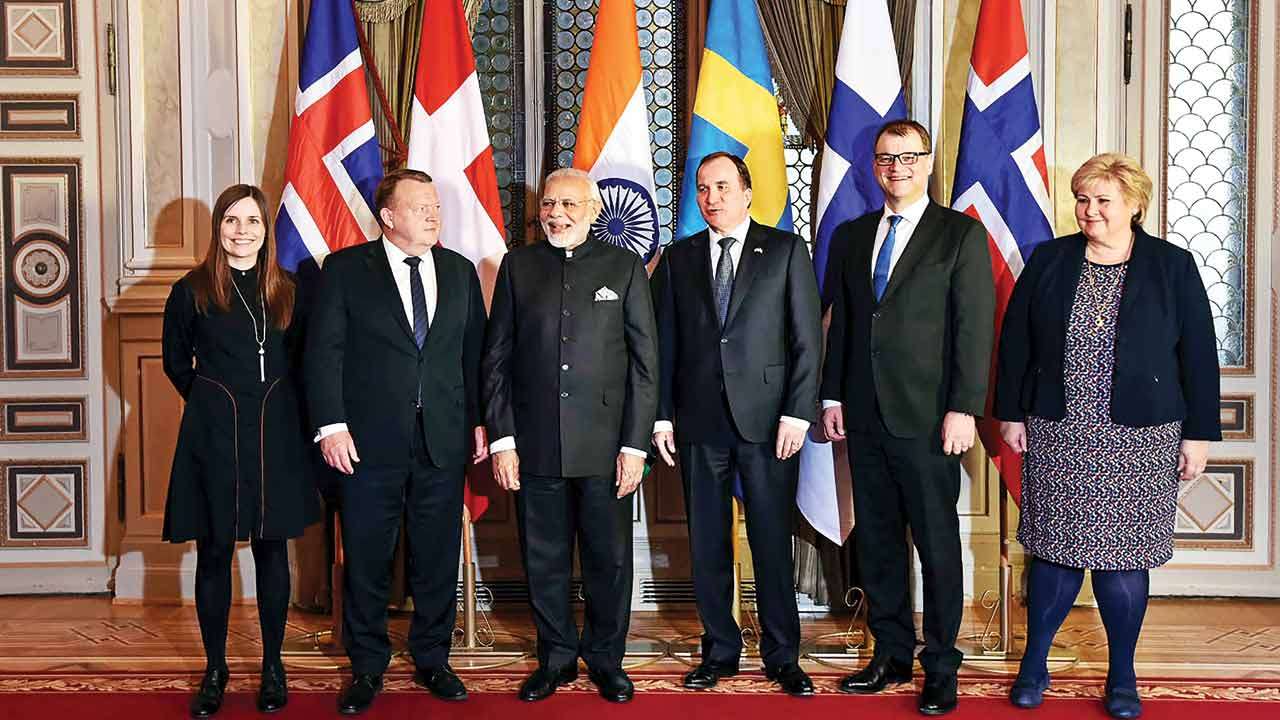
Prime Minister Narendra Modi voyaging to Sweden for an India-Nordic Summit has not happened a day too soon. For at least two decades now, India has neglected the Nordic region – comprising Sweden, Denmark, Norway, Iceland and Finland – known as Norden (the North).
Since the late 1990s, after the United Front experiment collapsed, neither the NDA of Atal Behari Vajpayee nor the UPA led by Manmonhan Singh cared to seriously engage these countries. The Nordic nations have an influence in global affairs out of all proportion to their size, profile and population.
Led by Sweden, long seen as a moral superpower for renouncing the nuclear option under pressure from the women’s movement in the 1950s, the Norden have been at forefront of advancing progressive causes which are central to human development. As pioneers of the ‘third way’ – upholding social democracy and the welfare state as an alternative to capitalism and communism – they struck a chord with Nehruvian India’s intellectual and governing elite.
From the 1950s to the 1980s, India-Nordic relations flourished on a variety of tracks. The most remarkable of these was the sustained engagement of thought leaders and intellectual-activists that spawned new paradigms rooted in human values, development rights, social policies and peace. The Nordic influence was evident in India’s academia, especially social sciences research, literature, the arts and cinema. The Nordic elite involved in these processes came to be known as ‘Third Worlders’ for their passionate, almost missionary, commitment to development and developing countries.
Swedish radio’s revelation of kickbacks in the Bofors gun deal did little damage to New Delhi’s ties with Stockholm. In fact, it led to media cooperation on the kickback trail.
Relations with the Norden hit a low under Vajpayee after the Pokhran nuclear tests of 1998. Although Sweden is a manufacturer of big weapons and Denmark of small, Nordic nations are dedicated to disarmament; and, development, to which they earmark a portion of their GDP. They felt that a recipient of development assistance should not spend money on nuclear weapons. It was a moral position. New Delhi resented these ‘small fellows’, as one minister called them, taking the moral high ground and cutting of the ‘little money’ they give for development. What made matters worse was the Vajpayee regime shutting out development assistance from these nations.
Post-1998, India’s focus was on fighting off US-led sanctions and entering the nuclear club. This pursuit of relations with the US, to the near exclusion of all others led to the Norden falling off the map. Manmohan Singh continued with Vajpayee’s single-minded pursuit of great power relations, although in his benign neglect, he did not tread on others’ toes. Long after the US-led ‘international community’ had all but accepted India as a n-weapon state, the Norden refused to make India an exception to the proliferation rule.
The Norwegian facilitation of peace talks between the LTTE and Sri Lanka revived the engagement. But despite the trust, with New Delhi being in the loop at all times, there was no warmth in the relationship. Nordic nations came to the attention of the Ministry of External Affairs (MEA) only when it was bad news.
Thus Denmark found itself in the diplomatic doghouse during much of the last eight years for not cooperating with India in the extradition of Kim Davy, main accused in the Purulia arms drop case of December 1995. The strained relations with Denmark were further vitiated when its state-owned broadcaster aired a covert film shot by a crew in violation of visa conditions. New Delhi reacted strongly and went to the extent of refusing visas to all Danish media figures, including the Ombudsman.
At present, there are no such prickly issues between India and the Norden. To the contrary, Nordic nations want India to intensify cooperation and play a larger role in the Arctic Council. Hence, there might be achche din for India’s relations with the Nordic nations.
During the India-Nordic Summit, the Prime Ministers pledged to deepen cooperation and focus on key issues related to global security, economic growth, innovation and climate change. Innovation and digital transformation are expected to underpin the engagement between India and the Norden. Doubtless, trade and investment are the binding element in any relationship these days.
However, there is much beyond the conventional that can enrich India’s relations with the Norden. They have proved that the welfare state and its social policies can produce very successful economic outcomes; that social policies, as propagated by the neo-liberals, are not an impediment to economic productivity.
There is much to admire in Nordic societies. On almost every indicator of human development from social well-being and public health to education and gender equality, they are at the top of the chart. These highly evolved, inclusive and income-equal societies with low unemployment are ahead in many ways, including digital development and stem cell research.
Today’s India may find much to learn from the Nordic nations, especially in the matter of public policy and keeping corruption out of public life.
If Modi’s visit rekindles interest in the Norden and revives the enthusiasm for robust engagement with a region, the country would gain immensely. At the least, the Nordic region would be back on India’s foreign policy map, from where it ought not to have gone missing for so long in the first place.
In renewing India’s engagement with the world’s most successful and harmonious societies, Modi might well have revived a journey on a Nehruvian path that was cut short not too long ago.
The author is an independent political and foreign affairs commentator and has a long association with the Nordic countries where he has contributed to and worked as Guest Editor with leading newspapers. Views are personal.